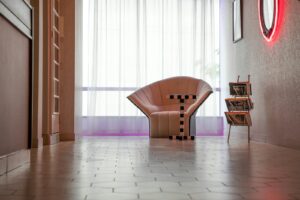Flooring plays a crucial role in setting the tone and ambiance of a space. Among the myriad of flooring options available, sheet vinyl flooring stands out as a versatile and practical choice. This article aims to delve into the pros and cons of sheet vinyl flooring, aiding readers in making informed decisions when considering flooring options for their homes or commercial spaces.
Pros of Sheet Vinyl Flooring
Sheet vinyl flooring is renowned for its numerous benefits, making it a compelling choice for homeowners and designers alike. From its exceptional durability to its wide range of designs and styles, sheet vinyl flooring offers several advantages that set it apart from other flooring options.
Durability and Longevity
One of the primary advantages of sheet vinyl flooring is its remarkable durability. Engineered to withstand heavy foot traffic and daily wear and tear, quality vinyl sheets can last for many years without showing signs of deterioration.
Wide Range of Designs and Styles
Sheet vinyl flooring offers an extensive array of designs, patterns, and colors, ranging from realistic wood and stone finishes to abstract motifs. This versatility allows homeowners and designers to find the perfect flooring solution to complement any interior aesthetic.
Easy Maintenance and Cleaning
Unlike some other flooring materials that require special treatments or cleaners, sheet vinyl flooring is exceptionally easy to maintain. Regular sweeping or vacuuming, coupled with occasional mopping using mild detergent, is usually sufficient to keep vinyl floors looking pristine.
Water and Stain Resistance
Sheet vinyl flooring is inherently resistant to moisture, making it an ideal choice for areas prone to spills or high humidity, such as kitchens, bathrooms, and basements. Its non-porous surface also repels stains, minimizing the risk of permanent discoloration.
Comfort and Warmth Underfoot
Unlike cold and hard surfaces like tile or stone, sheet vinyl flooring offers a softer and warmer feel underfoot, enhancing comfort and reducing fatigue, especially in areas where prolonged standing is common, such as kitchens.
Cost-Effectiveness
In terms of upfront cost and long-term value, sheet vinyl flooring often proves to be a cost-effective choice compared to alternatives like hardwood or ceramic tile. Its relatively low installation and maintenance costs make it an attractive option for budget-conscious homeowners.
Cons of Sheet Vinyl Flooring
While sheet vinyl flooring boasts many advantages, it is not without its drawbacks. Understanding the potential limitations of sheet vinyl flooring is essential for making informed decisions when selecting flooring options. In this section, we will examine the cons of sheet vinyl flooring, addressing factors such as susceptibility to damage, environmental concerns, and installation challenges.
Susceptibility to Damage
While sheet vinyl flooring is durable overall, it can be vulnerable to damage from sharp objects like heavy furniture legs or dropped kitchen utensils. Care should be taken to use furniture pads and avoid dragging heavy items across the floor to prevent scratches or tears.
Vulnerability to Fading and Discoloration
Despite advances in manufacturing technology, some lower-quality vinyl flooring products may exhibit fading or discoloration over time, particularly when exposed to prolonged sunlight or harsh cleaning chemicals.
Environmental Concerns with PVC Content
Sheet vinyl flooring is typically made from polyvinyl chloride (PVC), a synthetic material that raises environmental concerns due to its production process and potential health risks associated with certain additives like phthalates. Environmentally conscious consumers may prefer alternative flooring materials with lower environmental footprints.
Installation Challenges, Especially in Irregularly Shaped Rooms
Installing sheet vinyl flooring can be more challenging in rooms with irregular shapes or obstacles like columns or built-in furniture. Achieving a seamless and professional-looking installation may require skilled labor and meticulous attention to detail.
Limited Repair Options
In the event of damage to a section of sheet vinyl flooring, repairing or replacing the affected area can be more challenging compared to individual tiles or planks. Depending on the extent of the damage and the flooring design, seamless repairs may be difficult to achieve.
Comparison with Other Flooring Options
Among the plethora of choices available, sheet vinyl flooring stands out as a versatile and practical option. However, it’s essential to compare sheet vinyl flooring with other popular flooring options to determine which best suits your needs and preferences. In this section, we will explore how sheet vinyl flooring stacks up against alternatives like hardwood, laminate, and ceramic tile flooring.
Comparison with Hardwood Flooring
While hardwood flooring offers timeless elegance and natural beauty, it can be more expensive and prone to scratching and water damage compared to sheet vinyl flooring.
Comparison with Laminate Flooring
Laminate flooring shares some similarities with sheet vinyl in terms of affordability and ease of installation but may lack the same level of water resistance and comfort underfoot.
Comparison with Ceramic Tile Flooring
Ceramic tile flooring offers exceptional durability and water resistance, but its hardness can be less forgiving underfoot compared to the softer surface of sheet vinyl flooring.
Read More
Vinyl Plank Flooring vs Vinyl Sheet Flooring
Vinyl Flooring for Bathrooms and Kitchens
Underlayment for Vinyl Plank Flooring on Concrete, Plywood and Hardwood
Does SPC Vinyl Flooring Need Underlayment





